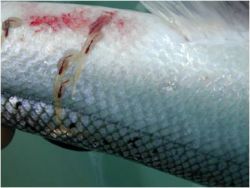The plan is centred around expanding their open-net pen salmon farms in St. Mary’s Bay, Shelburne and the Eastern Shore, and its announcement comes on the heels of news that Cooke Aquaculture is under investigation due to an outbreak of infectious salmon anaemia at one of their operations in the province.
Open-net pen salmon farming is an extremely controversial practice. One one hand, there is considerable, although not entirely conclusive, scientific evidence that points to open-net pen farming as having a high degree of risk for the local environment and the health of both farmed fish and local wild fish stocks, as well as human health. Keeping large numbers of fish in close quarters for long periods of time can make the spread of disease and parasites a serious problem, especially if said diseases and parasites escape into the ecosystem. Salmon farms also need to be located in areas where the currents can easily carry away the waste produced by the fish, otherwise the accumulation of waste can pose a threat to nearby fish and shellfish populations.
The salmon farming industry argues that with proper procedures and safeguards, these risks can be managed and mitigated. The provincial government seems to agree with this position, and the province's recently-issued aquaculture strategy calls for a review of of existing regulations and policies, but stops well short of the full moratorium on open-net pen farming called for by the Ecology Action Centre and over 100 other groups.
So, who's right? Essentially this question boils to one of risk management. We know that there are plenty of risks and problems with open pen salmon farming, and we know that there are ways to lessen those risks and deal with problems when they arise. What we need to decide is whether the risks involved, and the means necessary to mitigate them, are worth any of the potential benefits.
The aquaculture industry is booming right now, with 50% of all fish consumed worldwide coming from aquaculture operations, so the economic incentive for places like Nova Scotia is huge.



